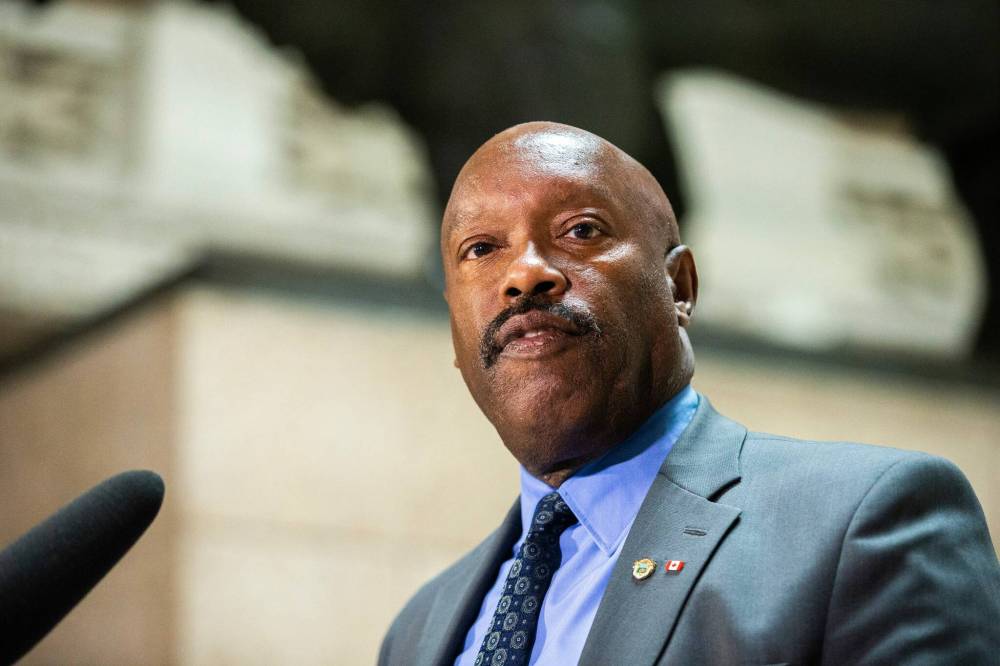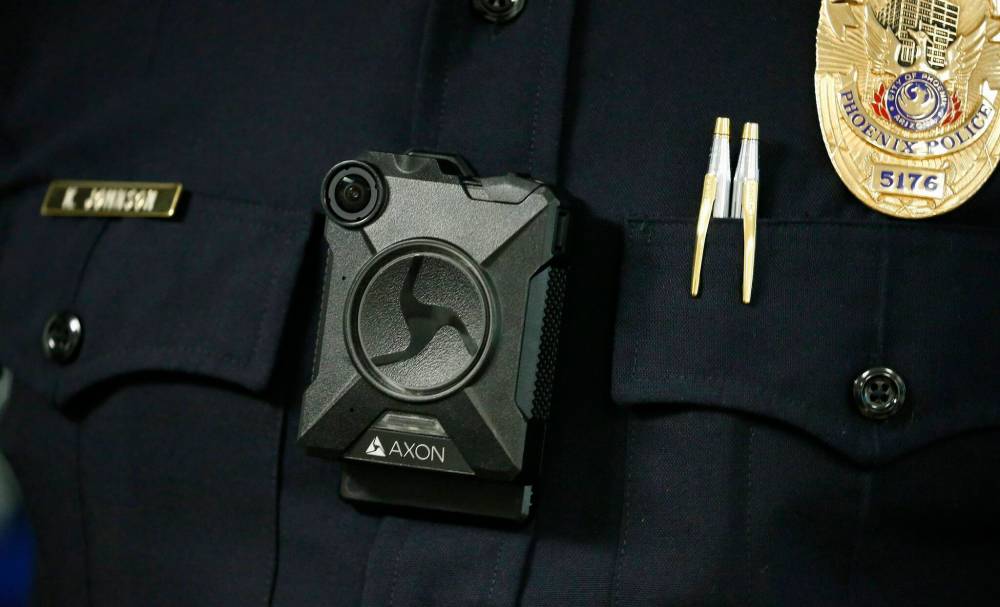When, not if, for police body cameras: councillor
Proponents say technology helps improve transparency, accountability, public trust
Advertisement
Read this article for free:
or
Already have an account? Log in here »
To continue reading, please subscribe:
Monthly Digital Subscription
$0 for the first 4 weeks*
- Enjoy unlimited reading on winnipegfreepress.com
- Read the E-Edition, our digital replica newspaper
- Access News Break, our award-winning app
- Play interactive puzzles
*No charge for 4 weeks then price increases to the regular rate of $19.95 plus GST every four weeks. Offer available to new and qualified returning subscribers only. Cancel any time.
Monthly Digital Subscription
$4.99/week*
- Enjoy unlimited reading on winnipegfreepress.com
- Read the E-Edition, our digital replica newspaper
- Access News Break, our award-winning app
- Play interactive puzzles
*Billed as $19.95 plus GST every four weeks. Cancel any time.
To continue reading, please subscribe:
Add Free Press access to your Brandon Sun subscription for only an additional
$1 for the first 4 weeks*
*Your next subscription payment will increase by $1.00 and you will be charged $16.99 plus GST for four weeks. After four weeks, your payment will increase to $23.99 plus GST every four weeks.
Read unlimited articles for free today:
or
Already have an account? Log in here »
Hey there, time traveller!
This article was published 20/11/2023 (782 days ago), so information in it may no longer be current.
While police officers in some Canadian cities already wear cameras on their uniforms, those in Winnipeg are not yet equipped with the technology despite strong support among decision makers.
It’s a matter of when, not if, for Winnipeg, given the ongoing rollouts by the RCMP and municipal police services in Alberta, according to Coun. Markus Chambers, the city’s police board chairman.
“As digital evidence management becomes more and more mainstream, (body-worn cameras) will inevitably become the default for the majority of police services,” Chambers wrote in an email. “I anticipate that it is a matter of time.”

There is no real request in front of city council at this time, he said.
An ongoing inquest into the individual deaths of five men who were in Winnipeg police custody has prompted more discussion about the potential use of body cameras in Manitoba.
Proponents say cameras help to improve transparency, accountability, public trust and evidence gathering, while resolving complaints more quickly and eliminating the need for some trials.
The technology presents concerns or questions about privacy, data collection and access, reliability and costs.
Body cameras have long been requested by the Winnipeg Police Service, but funding has been a roadblock. Council approved a pilot project in 2015, but it was scrapped ahead of its 2017 start for budget reasons.
When the matter resurfaced in 2021, council voted down a request to increase the WPS budget to purchase the technology.
Then-mayor Brian Bowman said existing funds from a police budget of more than $300 million should be used for the purchase.
At the time, the cost of more than 1,300 cameras was estimated at $7 million, with annual operating costs, including digital video storage and staff, of about $4 million.
Police in Altona, a town of about 4,300 people, began using body cameras in 2021 at a then-annual cost of about $4,500. When activated, footage is recorded using an app on police-issued smartphones that are tucked into officers’ protective vests.
The RCMP is planning to give body cameras to up to 15,000 officers nationwide. The rollout was supposed to begin in stages in 2023 and 2024, following trials in parts of Alberta, Nova Scotia and Nunavut, but hasn’t started yet.
So far, there is no start date for RCMP officers in Manitoba, said spokeswoman Tara Seel.
“We look forward to the conclusion of that project and a determination about the rollout of body-worn cameras to officers in Manitoba,” she wrote in an email.
Officers in Toronto, its suburbs and Calgary are among those who wear cameras on a permanent basis. In Vancouver, about 100 officers were expected to take part in a six-month trial that started this month.
A trial began in Edmonton earlier this year, after Alberta’s government announced a planned mandate for municipal police services.
There has been no mandate nor funding commitments from the current or previous government in Manitoba.
Justice Minister Matt Wiebe, who was sworn in last month after the NDP’s October election win, said the department has been in contact with the WPS and RCMP to discuss cameras.
“We want to work closely with them to understand their needs and some of the challenges they’re going to be facing,” he said.
The WPS did not provide a comment before deadline.
The Criminal Defence Lawyers Association of Manitoba would welcome body-worn cameras, said spokesman Chris Gamby.

He said clear video evidence would help resolve matters and avoid the need for some trials.
“There’s no reason for us not to have it,” the Winnipeg-based defence lawyer said.
Fellow defence lawyer Scott Newman is also a proponent of body-worn and in-vehicle cameras for police.
Video that captures the entirety of an incident doesn’t have the same frailties as an eyewitness, he said.
“It doesn’t forget,” he said. “It doesn’t miss things.”
Police departments in the United States have been quicker than those in Canada to use cameras, he noted.
Brandon Trask, an assistant professor of law at the University of Manitoba, said “significant” protocols would be necessary for matters such as privacy and the storage, retention and deletion of footage held by police.
“The footage from body cameras would constitute excellent evidence and would be very helpful in court,” he said.
The Toronto Police Service has worked with Ontario’s information and privacy commissioner to address privacy issues.
Video is stored for at least a year unless there is a reason, such as a court case or ongoing investigation, to keep it longer.
Officers are required to turn on their camera before arriving at a call, when they start investigating a person or when they’re asking questions to gather information.
They can stop recording when the call or investigation is finished or when the officer decides further recording is no longer serving its intended purpose.
The RCMP has a similar policy for its trial and planned rollout. Its officers are required to document when they turn off a body camera or when the device accidentally deactivates.
There are certain situations — intimate searches, for example — when it would not be appropriate to have the camera on, according to the RCMP’s policy.
Given the expectation of privacy in places such as a house or hospital, officers must obtain consent before recording in circumstances that are not urgent.
chris.kitching@freepress.mb.ca

Chris Kitching is a general assignment reporter at the Free Press. He began his newspaper career in 2001, with stops in Winnipeg, Toronto and London, England, along the way. After returning to Winnipeg, he joined the Free Press in 2021, and now covers a little bit of everything for the newspaper. Read more about Chris.
Every piece of reporting Chris produces is reviewed by an editing team before it is posted online or published in print — part of the Free Press‘s tradition, since 1872, of producing reliable independent journalism. Read more about Free Press’s history and mandate, and learn how our newsroom operates.
Our newsroom depends on a growing audience of readers to power our journalism. If you are not a paid reader, please consider becoming a subscriber.
Our newsroom depends on its audience of readers to power our journalism. Thank you for your support.
History
Updated on Monday, November 20, 2023 6:41 AM CST: Adds missing cutlines






